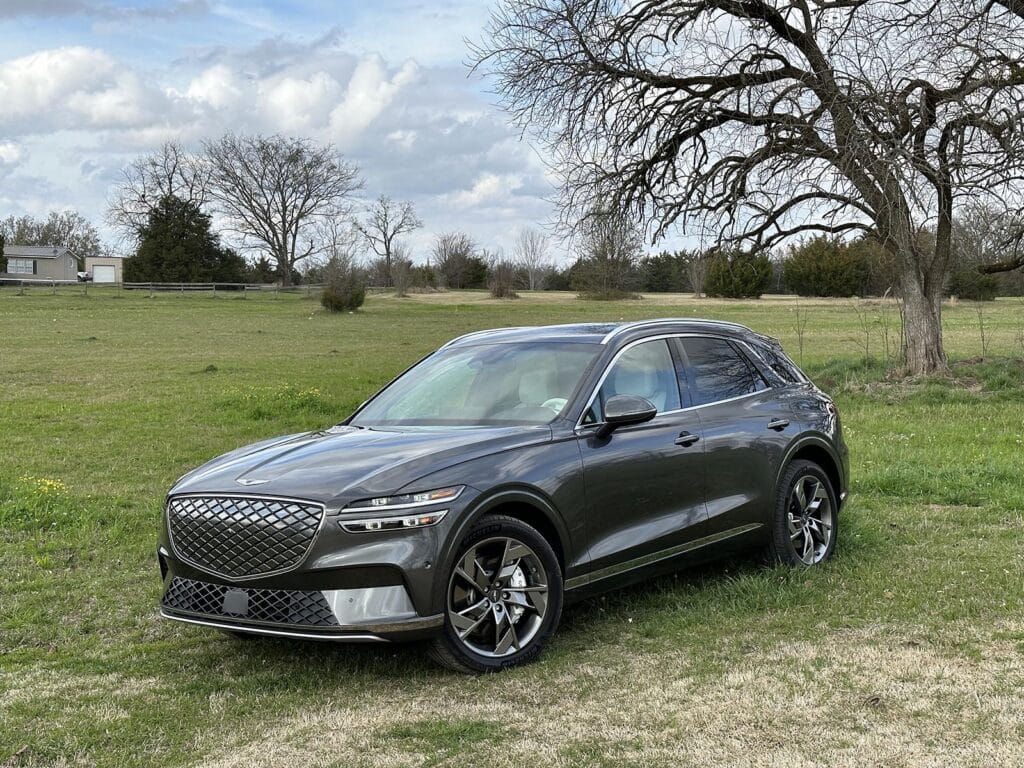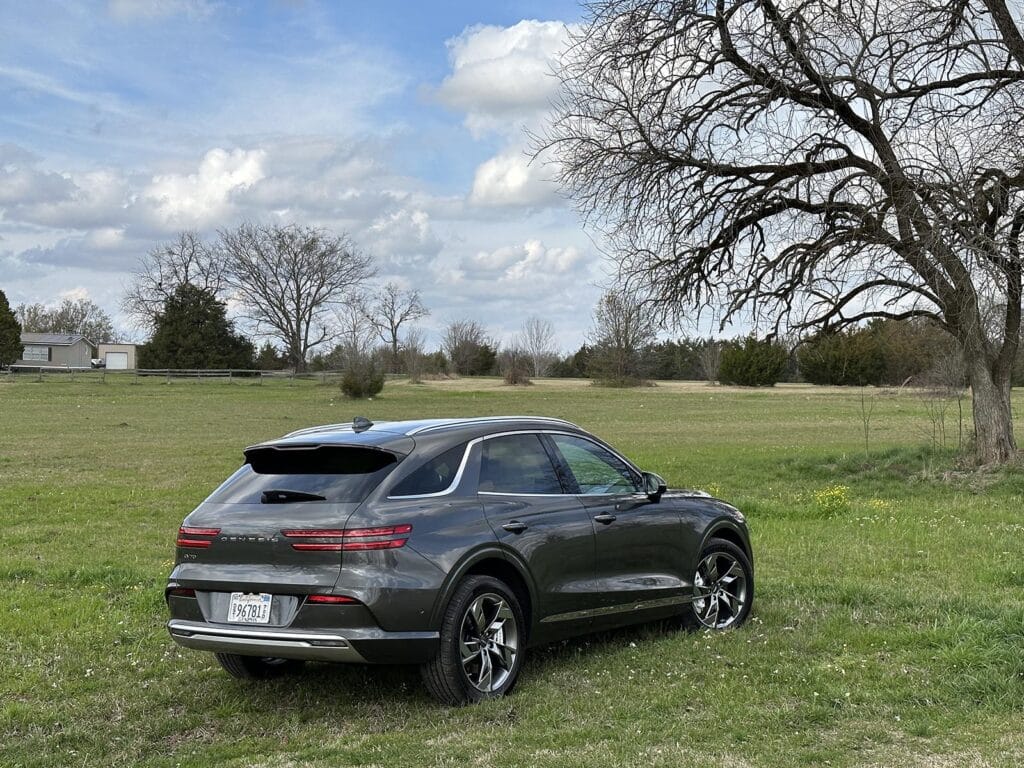The big Hyundai assembly plant in Montgomery, Alabama officially launched production of the Electrified Genesis GV70 this week, the battery-powered SUV becoming the first of the South Korean carmaker’s luxury brand models to be produced in the United States.
The move offers a number of advantages, according to Genesis officials. It makes it quicker and easier to deliver the new battery-electric vehicles to U.S. customers. And it also means that the battery-powered version of the GV70 qualifies for up to $7,500 in buyer incentives under the Inflation Reduction Act passed by Congress last year.
And as the third EV in the Genesis line-up it becomes the next “step in becoming all-electric brand by 2030,” said Tedros Mengiste, U.S. vice president of sales for Genesis, during a media panel session at the Montgomery plant.
First U.S. model
Virtually all automotive manufacturers are now adding battery-electric vehicles to their product portfolios. Genesis is one of a growing number of foreign-owned brands adding or moving EV production to the U.S., in many cases specifically to qualify for federal incentives. The list includes marques such as Volkswagen, Volvo, Polestar and Mercedes-Benz.
A handful of media outlets, including TheDetroitBureau.com, were invited to view the official production launch at the Montgomery plant on Tuesday. The factory first opened in 2005 and today employs about 3,800 “team members,” the term Hyundai officials prefer over “workers.”

Capable of producing up to 400,000 vehicles annually, the facility is one of the more flexible auto assembly operations in the U.S. It already was producing an assortment of Hyundai models, including the Santa Cruz pickup and the hybrid version of the Santa Fe SUV.
The Electrified GV70 becomes both the first Genesis model to be built in the U.S., as well as the Montgomery plant’s first all-electric model.
Just-in-Time
It is produced on the same assembly line as the rest of the plant’s vehicles. For a casual observer, the most distinguishing feature is the bright blue protective cover laid over the front fenders to prevent paint scratches during the assembly process. Each model gets its own color.
The factory operates on a “Just-in-Time” basis, parts typically delivered by suppliers within an hour of when they are needed. It also operates on a “Just-in-Sequence” basis, with those parts rolling off the delivery trucks in the order they will be needed on the line.
Eventually, nearly finished vehicle bodies reach the “marriage” station where they are paired with their powertrains. Today, most are mated to internal combustion engines. When an Electrified GV70 arrives on an overhead conveyer it finds an electric motor drive system waiting below. Quickly, body and drivetrain become one, workers torquing down bolts and plugging in electrical cables.

The marriage process
For now, at least, nearly completed versions of the Electrified GV70 are moved off the line and delivered to a special station where they go through a second marriage process, this time being paired with a 77.4 kilowatt-hour lithium-ion battery pack. That’s the same pack used in the South Korean-made, all-electric Genesis GV60 that was launched in the U.S. last year.
The process is slow by automotive standards, currently adding five to 10 minutes of labor, where team members at the Hyundai plant’s typical workstation take as little as 52 seconds to complete their chores.
It’s a tolerable exception when the Alabama plant is rolling out just 15 Electrified GV70 SUVs a day, and only during the factory’s first shift. But Hyundai Motor Manufacturing Alabama Vice President Robert Jones said the automaker is prepared to “add it to the second shift” if demand is there, and may eventually modify the line to simplify the process of plugging in the battery pack
Accelerating demand
For his part, Genesis sales chief Mengiste said he’s confident the demand will be there. Genesis sales got off to a slow start when the brand debuted with an all-sedan line-up seven years ago. But they’ve accelerated rapidly with the introduction of new SUVs like the gas-powered GV70 and GV80 models. And demand has exceeded initial availability for the brand’s first all-electric model, the GV60.

It’s helped that this battery-powered SUV has won an assortment of awards, last month being named the Luxury Family Vehicle of the Year by the Midwest Automotive Media Association. It was a strong runner up for North American Utility Vehicle of the Year, with the 50 U.S. and Canadian journalists ultimately nodding in favor of the EV6, an SUV built by sibling brand Kia.
The EV6, like the Genesis GV60, is based on a platform developed specifically developed for battery-electric vehicles. It’s known internally as the E-GMP architecture. The Electrified GV70, on the other hand, shares the same, flexible platform used for the gas-power GV70. There are some compromises to that approach and, long-term, Genesis will use the E-GMP for the numerous other EVs in its pipeline.
Going all-electric
By 2025, Mengiste said, all new products will be 100% electric, “and by 2030, all of our sales will be.”
That makes Genesis one of the world’s most aggressive brands when it comes to making the switch to EVs, along with Acura, Bentley, Cadillac, Jaguar and Volvo. By and large, luxury brands are leading the charge.

“Luxury buyers are better positioned to go all-electric because their buyers are more willing to absorb the higher costs,” said Stephanie Brinley, associate director with S&P Global Mobility.
A steep price premium
A base Genesis GV70 with a 2.5-liter turbo gas motor starts at $41,000. The Electrified version starts at a much stiffer $65,850 plus $1,125 in delivery fees. That’s not precisely an apples-to-apples comparison, the battery model offering better performance and more luxury features, but it’s still a steep jump, according to analysts like Brinley.
And that’s why the ability to give buyers as much as $7,500 in federal tax credits should help, Genesis officials acknowledged.
Still, the Electrified GV70 has to go up against a growing list of competitors. And that includes the Tesla Model Y, the absolute sales king in the electric SUV market. It doesn’t help that Tesla last month announced a price cut of as much as 20% on some of its products.
Tesla delivers “a surprise”
That move came “as a surprise,” Mengiste acknowledged, adding that Genesis won’t try to match Tesla’s discount on either the Electrified GV70 or the original GV60 SUV.
For now, it is looking to build up demand slowly, as the production rate at the Hyundai plant in Montgomery suggests. Indeed, the GV60 is only beginning to roll out nation wide, soon to be offered in nine U.S. markets.
The first of the new Electrified GV70 SUVs will be delivered in March, Genesis expected to open up an order bank in the coming weeks.

